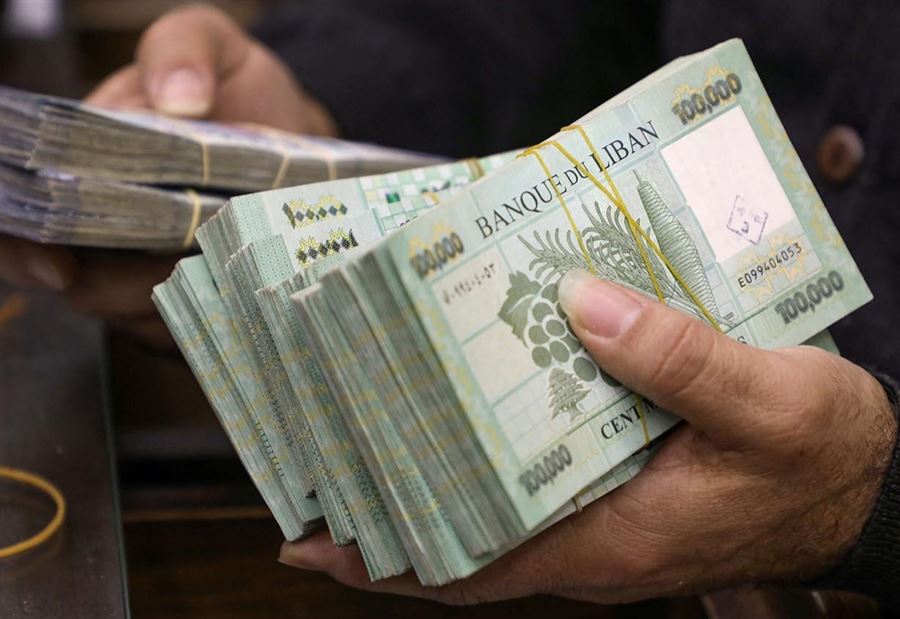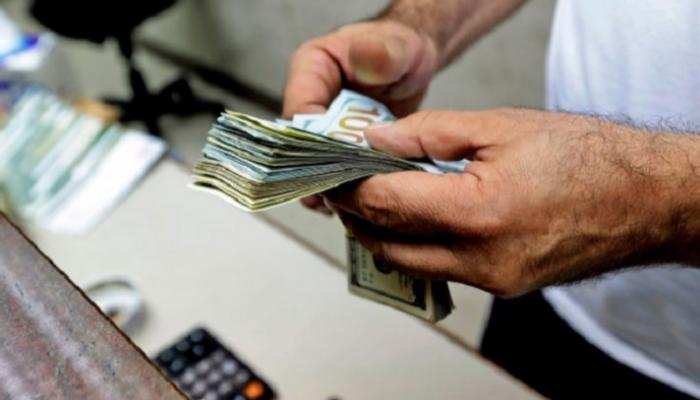يوم الأربعاء الماضي أصدر مصرف لبنان بياناً طلب فيه من المصارف التسديد، استثنائيا ولمرة واحدة، مبلغ يساوي ثلاث دفعات شهرية في بداية شهر تشرين الاول المقبل، لكل المستفيدين من التعميمين الاساسيين رقم 158و166.
وجاء في البيان :” بالنظر الى الظروف الطارئة التي تمر بها البلاد، قرر المجلس المركزي لمصرف لبنان المنعقد بتاريخ 25 ايلول 2024 الطلب الى المصارف التسديد، استثنائيا ولمرة واحدة، مبلغ يساوي ثلاث دفعات شهرية في بداية شهر تشرين الاول المقبل، لكل المستفيدين من التعميمين الاساسيين رقم 158و166.
مع الاشارة الى ان العمل باحكام التعميمين المذكورين يستمر في شهر تشرين الثاني بشكل طبيعي”.
حول أهمية هذا البيان في هذه الظروف الصعبة التي تعيشها البلد و المواطنون سيما الذين يتعرضون للقصف الإسرائيلي الغاشم وإمكان مساهمته في استقرار سعر الصرف تحدث للديار الخبير في الشؤون المصرفية والباحث في الاقتصاد محمد فحيلي، الذي لم يقلل من أهمية هذا التعميم لأن اليوم المودع خصوصاً أصحاب الودائع الصغيرة بحاجة لأي دعم أو جرعة سيولة تساعدهم في تمويل فاتورة الاستهلاك لكن يعتقد فحيلي أنه في ظل الغلاء الفاحش في لبنان فإن منصوري يعلم ان هذا المبلغ قليل جداً ” و كان من الأفضل ان يكون القرار بشكل يؤمن مبلغاً من المال يكفي المودع لمدة شهرين و ليس شهرا واحدا”.
ورأى فحيلي ان الذين يستفيدون من التعميم ١٦٦ ب ١٥٠ دولارا شهرياً كان يجب ان يقر لهم الحاكم بالحد الأدنى بالمبلغ الذي يستفيد منه المودع وفق التعميم ١٥٨ (٤٠٠ و ٣٠٠ دولار) .
ويقسم فحيلي المستفيدين من هذه التعاميم إلى ثلاث مجموعات : مجموعة تستفيد بموجب ١٥٠ دولارا ومجموعة تستفيد بموجب ٣٠٠ دولار ومجموعة تستفيد بموجب ٤٠٠ دولار ، مشيراً أن هذه المجموعات الثلاث يواجهون غلاء المعيشة نفسه والأسعار نفسها لسلة الاستهلاك ولذلك يرى فحيلي أن توحيد المبلغ ضروري جداً سيما في هذه الظروف الاستثنائية التي تمر بالبلد وأهمها الوضع في المستشفيات التي استنفدت كل مخزونها الاستراتيجي بعد الأحداث الأمنية الأخيرة .
ووفقاً لفحيلي بالرغم من إيجابيات بيان مصرف لبنان لكنه لا يضع المصارف أمام مسؤولياتهم تجاه المجتمع اللبناني وكان من الأجدى أن يوسع هذا البيان من إجراءاته حتى يتضمن إجبار المصارف على تأمين السيولة للمستشفيات و تأمين سيولة لبعض المتقاعدين الذين تدنت القيمة الشرائية لرواتبهم بنسبة أكثر من ٨٥% ، لافتاً ان كل هذه الأمور من ضمن صلاحيات مصرف لبنان ومن ضمن قدرة المصارف على الاستجابة لهذا الطلب.
واعتبر فحيلي تحديد المستفيدين من التعميمين ١٥٨ و ١٦٦ من دون الدخول في تفاصيل لجهة حجم الاستفادة الشهرية وكمية جرعة السيولة التي ستعطى للمستفيدين ( دعسة ناقصة) ويجب أن يستفيد الجميع بنفس المبلغ معتبراً ان مصرف لبنان قام بواجباته تجاه المواطن اللبناني أو تجاه جزء من المجتمع اللبناني.
وإذ لفت فحيلي إلى أن هناك عدداً كبيراً من المودعين لم يحصلوا بعد على موافقة مصرف لبنان وكانوا قدموا طلب الاستفادة من التعميم 166 والتعديلات على التعميم 158 رأى انه من الاجدى على مصرف لبنان ان يتحرك بسرعة ويحل هذه الاوضاع كي يستفيد المودعون من هذه التقديمات، “لانه في صياغة البيان ذكر “لمرة واحدة” اي ان هناك احتمالا مع نهاية شهر تشرين الاول اذا بقيت الاوضاع على ما هي، ان يخسر هؤلاء حقهم في الاستفادة من هذه التعاميم”.
وسأل فحيلي اذا كانت الاستفادة لمرة واحدة فقط من هذين التعميمين ولفترة ثلاثة اشهر، هل سيتوقف هذا الامر في تشرين الثاني وكانون الاول وكانون الثاني 2025؟ او يبقى المودع يستفيد ما دام لديه اموال في رصيده؟
ورداً على سؤال حول مصير سعر الصرف في حال استمرار الحرب وتوسعها استبعد فحيلي حدوث اضطرابات في سعر الصرف لان طببعة الحرب التي نعيشها ستسبب انكماشا اضافيا في الاقتصاد اللبناني، “وبما ان هذا الاقتصاد مدولر فإن الحاجة للدولار تتدنى”، متوقعاً ان ما يتوافر في الاقتصاد اللبناني من دولار يكفينا لحوالى 4 اشهر او اكثر بقليل من دون حدوث اضطرابات في سعر الصرف.
لكن اذا استمرت الحرب لفترة اطول يقول فحيلي “عندئذ فلكل حادث حديث فلربما ساعدتنا الدول الصديقة وبدأت بتمويل النزوح من المناطق المنكوبة واعادة الاعمار وعودة النازحين بعد انتهاء الحرب. كل هذه الامور تؤدي دورها في مدى استقرار سعر صرف الدولار”.
ويشير فحيلي إلى أن اي سيولة تأتي من الخارج دعما للبنان ستساهم في الاستقرار، والمواد التي نستوردها من الخارج كالقمح والادوية والفيول في حال لم يتم حصول طلب استثنائي عليها فيبقى وضعنا جيدا، “وبحسب ما اسمع من مستوردي المواد الغذائية والطاقة ووزير الاقتصاد أن لدينا مخزون كاف ل3 اشهر، لكن اذا استمرت هذه الازمة الى بعد هذا التاريخ فان لبنان لن يحتمل”.
المصدر: أميمة شمس الدين – الديار
### Welcome to the Central Bank of Lebanon's Announcement on Three Installments in October
Last Wednesday, the Central Bank of Lebanon issued a statement requesting banks to make an exceptional one-time payment equivalent to three monthly installments at the beginning of October for all beneficiaries of the two primary circulars, numbers 158 and 166.
The statement read: “In light of the emergency circumstances the country is experiencing, the Central Council of the Central Bank, convened on September 25, 2024, decided to request banks to make an exceptional one-time payment equivalent to three monthly installments at the beginning of October for all beneficiaries of the two primary circulars, numbers 158 and 166.”
It is noted that the provisions of the aforementioned circulars will continue to operate normally in November.
### Importance of the Announcement
Regarding the significance of this announcement in the current difficult circumstances, particularly for those exposed to relentless Israeli bombardment, and its potential contribution to stabilizing the exchange rate, banking expert and economic researcher Mohammad Fakhri spoke to *Ad-Diyar*. He emphasized that this circular is important, as depositors, especially those with small deposits, need any support or liquidity boost to help them cover their consumption bills. However, Fakhri believes that given the exorbitant inflation in Lebanon, the amount provided is very minimal. “It would have been better for the decision to secure enough funds to cover depositors for two months instead of just one.”
Fakhri noted that those benefiting from circular 166 at $150 per month should have been guaranteed at least the minimum amount provided to depositors under circular 158 ($400 and $300).
He categorizes the beneficiaries of these circulars into three groups: those benefiting from $150, those benefiting from $300, and those benefiting from $400. He pointed out that all three groups face the same cost of living and the same prices for consumption baskets. Therefore, Fakhri sees it as essential to unify the amount, especially given the exceptional circumstances in the country, particularly the situation in hospitals that have exhausted all their strategic reserves following recent security events.
### Limitations of the Announcement
According to Fakhri, despite the positives of the Central Bank’s announcement, it does not hold banks accountable for their responsibilities toward the Lebanese community. It would have been better to expand the announcement's measures to include mandatory liquidity provisions for hospitals and for some retirees whose purchasing power has declined by over 85%. He noted that all these matters fall within the authority of the Central Bank and the banks' capability to respond to this request.
Fakhri considers that defining the beneficiaries of circulars 158 and 166 without delving into the specifics of monthly benefits and the amount of liquidity provided is a “misstep.” He believes that everyone should benefit from the same amount, arguing that the Central Bank has fulfilled its obligations to the Lebanese citizen or part of the Lebanese community.
He also pointed out that many depositors have yet to receive approval from the Central Bank despite applying for benefits from circular 166 and amendments to circular 158. He believes it would be wise for the Central Bank to act quickly to resolve these situations so that depositors can benefit from these provisions, noting that the phrasing of the statement indicated “one-time only,” implying that by the end of October, if conditions remain unchanged, these depositors may lose their right to benefit from these circulars.
### Future Prospects
Fakhri questioned whether the benefits from these two circulars would be a one-time occurrence for three months or if depositors would continue to benefit as long as they have funds in their accounts in November, December, and January 2025.
In response to a question about the exchange rate's fate if the war continues and escalates, Fakhri ruled out the possibility of exchange rate disturbances. He explained that the nature of the war we are experiencing would cause further economic contraction in Lebanon. “Since this economy is dollarized, the demand for dollars decreases,” he predicted that the available dollars in the Lebanese economy would suffice for about four months or a little more without causing exchange rate disturbances.
However, if the war persists for a longer duration, Fakhri remarked, “Then we will have to address each situation as it arises; perhaps friendly countries will assist us and start financing the displacement from the affected areas, reconstruction, and the return of displaced people after the war. All these factors will play a role in stabilizing the exchange rate.”
He pointed out that any liquidity coming from abroad to support Lebanon would contribute to stability. The goods imported from abroad, such as wheat, medicines, and fuel, should remain stable unless there is exceptional demand for them. “According to what I hear from food and energy importers and the Minister of Economy, we have enough stock for three months. However, if this crisis continues beyond that date, Lebanon will not be able to withstand it.”
translated by economyscopes team
 سكوبات عالمية إقتصادية – EconomyScopes إجعل موقعنا خيارك ومصدرك الأنسب للأخبار الإقتصادية المحلية والعربية والعالمية على أنواعها بالإضافة الى نشر مجموعة لا بأس بها من فرص العمل في لبنان والشرق الأوسط والعالم
سكوبات عالمية إقتصادية – EconomyScopes إجعل موقعنا خيارك ومصدرك الأنسب للأخبار الإقتصادية المحلية والعربية والعالمية على أنواعها بالإضافة الى نشر مجموعة لا بأس بها من فرص العمل في لبنان والشرق الأوسط والعالم




